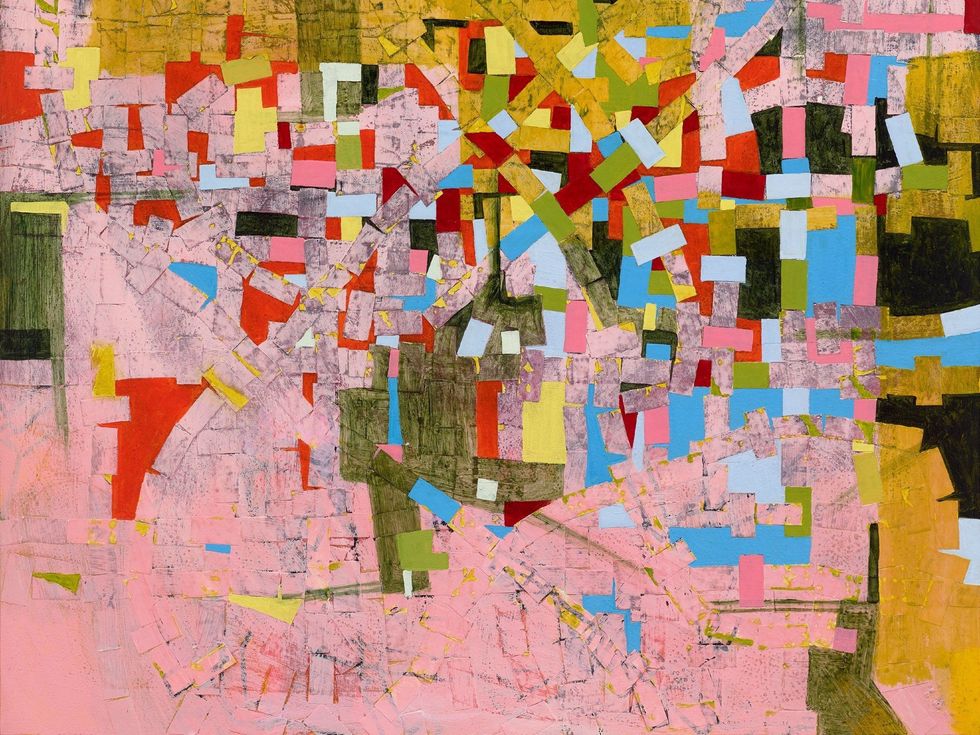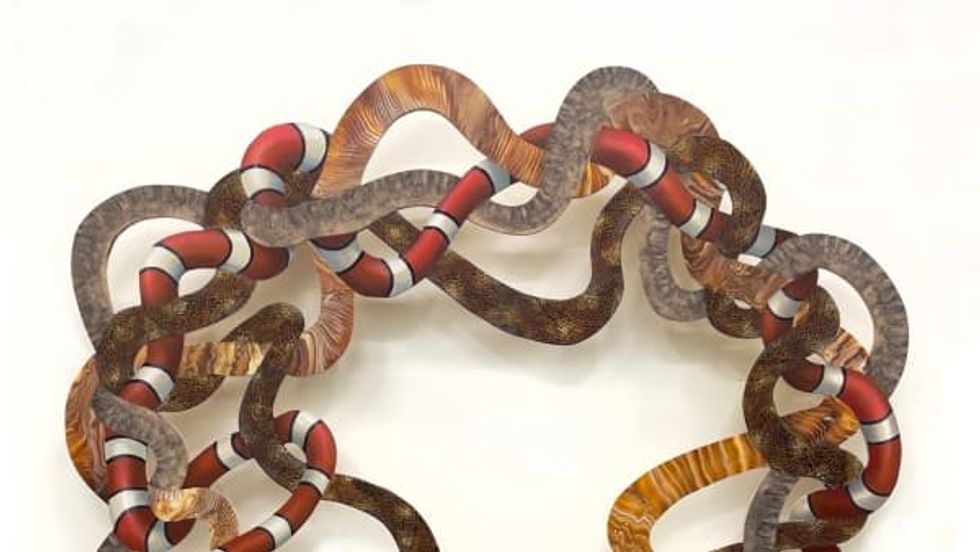Five Questions
Making music drama: Tobias Picker returns to Houston 22 years later with anotherworld premiere
 Tobias Picker served as Houston Symphony's composer-in-residence from1985-1990...
Tobias Picker served as Houston Symphony's composer-in-residence from1985-1990... After 22 years since his last premiere in Houston, Da Camera's artistic directorand pianist Sarah Rothenberg commissed Picker's first Piano Quintet...Photo by David A. Brown
After 22 years since his last premiere in Houston, Da Camera's artistic directorand pianist Sarah Rothenberg commissed Picker's first Piano Quintet...Photo by David A. Brown ...which will be premiered Friday with the Brentano String Quartet.
...which will be premiered Friday with the Brentano String Quartet.
For most classical music presenting organizations, traditional repertoire is the bread and butter of their operations. It's what (generally) brings in audiences and cash. Beethoven Symphony No. 9, Brahms Violin Concerto and Mozart'swhatever seems to always attract a throng of listeners.
Ever notice when you look at most concert programs, the main work is listed as the title of the concert? Marketing 101.
Nothing against the music of yesteryear. I am almost always in the mood for something deliciously impressionistic, dark and German and passionate and Italian. At the same time, I am thankful for those that are responsible for exposing me to new art music — that includes Musiqa, Nameless Sound, Divergence Vocal Theater, University of Houston, Shepherd School of Music, Houston Grand Opera and of course, the Houston Symphony, each in its own way.
Da Camera is no stranger to new or rarely heard art music. That's one of the genres it does best. In fact, I am indebted to artistic director Sarah Rothenberg for continuing to program pieces that reinforce that there is so much more to experience in our ever expanding milieu.
For its 2011-12 season opening concert, set for Friday night at the Wortham Theater Center, Da Camera plans to do just that with a world premiere commissioned from internationally-acclaimed composer Tobias Picker. His first — and perhaps only — piano quintet will end a 22-year H-Town hiatus from when he was composer-in-residence for the Houston Symphony (1985-1990).
CultureMap spoke to Picker about the composition, his approach and his connection with the Bayou City.
CultureMap: Recent commissions and projects have veered you towards opera and ballet — like The Metropolitan Opera commission of An American Tragedy, the world premiere of Thérèse Raquin on The Dallas Opera stage and the ballet Awakenings, which UK-based Rambert Dance Company took on tour last year.
Does your involvement with these projects influence your instrumental writing? Is the piece programmatic, narrative?
Tobias Picker: In instrumental writing, I like to think of characters, even though the ideas are abstract, without words nor explicit action. I still think of the instruments as players in a drama.
If I truly wanted to imply a narrative, a tale, the piece would not be an instrumental quintet, it would be an opera or something along that genre. I didn't want to do that, I wanted an abstract piece. Music drama is not something I invented, it has been around for a long time.
CM: Let's talk more about this drama and how it manifests in your piano quintet. Is there a main character?
TP: In any piano quintet, the piano comes first, so I treated it as the central character in the drama, and that was my way into the piece. It doesn't mean that the other instruments are accompanying and secondary.
I do prefer to know the sound of a player before I write, so I can imagine more accurately what I am writing. When I hear it in my head, the process is much more comfortable. However, the piece is not player-specific.
CM: Can you give us any listening tips?
TP: There were ideas in my ballet Awakenings that I wanted to develop a bit further, so I quoted myself in the Piano Quintet, though it's not very significant. The ballet hasn't been played in the United States yet, so I don't intend for listeners to make the connection. It's not as if I was quoting pieces everyone knows.
The music is very active, at times very passionate, at times playful, with the piano almost always playing. The piano score is extraordinarily difficult, technically and musically, putting the instrument at the center of the composition.
It's hard for me to talk about my own music when I feel I am too close to it, especially when it's brand new. It's when I have had some distance from the work that I can talk more about it objectively.
CM: About your piano quintet, you wrote that "perhaps it was no coincidence that Schumann, Brahms, Dvořák, Franck, Elgar, Shostakovich and Carter had each written only one." What is it about the genre that made it difficult for you to find a way into the piece? How was that different than writing Nova, a quintet using the Trout's configuration?
TP: Even though the other work (Nova) is for four strings (violin, viola, cello, bass) plus piano — like Schubert'sTrout Quintet — the ensemble is not what I would refer to as a typical piano quintet (two violins, viola, cello).
This is my first and last. It's a five-movement work, roughly 25-minutes long where I said everything I have to say about a piano and a string quartet playing together. I can't imagine having more to say as I believe I have made a substantial statement with this piece. Evidently, I am not alone as other composers, after tacking this ensemble, felt the same way.
CM: Houston was, for many years, a major center for the premiere of your works. Your Symphony No. 2, Symphony No. 3 and Romance and Interludes — written for former principal oboist Robert Atherholt — received their first hearing in Houston.
TP: I am very happy I am appreciated in Houston. I loved my time as composer-in-residence with the Houston Symphony during which I fell in love with Houston and Texas. Old and Lost Rivers (recorded by the Houston Symphony with Christoph Eschenbach in 1998) means something to people here and it is one of my most performed works, at least it used to be until more recent compositions.
Not everything I wrote in Houston was well received, though I remember the arts organizations really wanted to be at the cutting edge of innovation and succeeded in doing so. That applied also to visual arts, theater and opera. Through the symphony, I offered audiences a lively and energetic palette of contemporary music. In a way, it was to keep up with what was happening at Houston Grand Opera, when there was a world premiere every single season.
It's been 22 years since my last Houston premiere. I am very excited to be back. Houston was my first exposure to Texas so I am looking forward to reconnecting with good friends.
Da Camera of Houston will kick off its 2011-12 season with the Brentano String Quartet, Metropolitan Opera's principal clarinetist Anthony McGill, mezzo-soprano Susanne Mentzer and pianist and Da Camera's artistic director Sarah Rothenberg Friday 8 p.m. at Wortham Theater Center. Tickets start at $28 and can be purchased by calling 713-524-5050 or online at dacamera.com.



!["Mami Wata Afrofuturism: 500 Years Back to the [Afro][F]uture"](https://houston.culturemap.com/media-library/mami-wata-afrofuturism-500-years-back-to-the-afro-f-uture.jpg?id=51962255&width=980)


